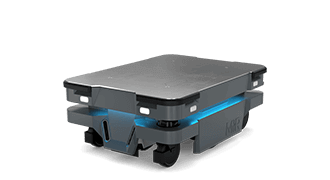03
Solution
MiR250 offers significant advantages, including use of REST APIs
The MiR250 had recently been introduced, and the team was attracted to its two-meters-per-second speed, the payload of 250 kilograms to handle heavy metal parts, and the ability to navigate narrow spaces. Standardizing on the MiR250 shelf-lifter and ROEQ carts allows DENSO to expand quickly into other areas using the same cart base and customizing it for each use.
The MiR robots bring significant advantages in flexibility, safety, and user-friendliness, and uniquely met other DENSO requirements as well. Olinger says, “MiR stood out from the ability to use REST API calls, the intuitive nature of the Fleet, the ease of mapping, ease of mission creation, ease of changing locations. It was just extremely intuitive compared to the other platforms that we looked at.”
Working with MiR partner Advanced Control Solutions (ACS), DENSO was able to develop an information flow using REST API to support on-time deliveries, manage charging and proximity cues to prioritize missions, and allow associates on the floor to call for the robots. DENSO has also integrated the robot to automatically open the door in and out of a clean-room area, using the MiR I/O modules to send wireless signals to the roll-up door controller.
MiR stands out from a business-model and support standpoint
Olinger explains how MiR as a company also stood out. “MiR was prepared to support us, as Denso North America, from the numbers we were going to roll out. We looked at some companies that just didn’t have that same support structure, and didn’t have that history, and we didn’t think that they could keep up.”
He adds, “The information-sharing has been huge. It’s not just a vendor that we’ve bought something from. They have grown with us, they have become a partner, and they are instrumental in how we are now expanding.”
MiR provided a week of onsite MiR Academy training, including for DENSO employees who could be groomed into super-user roles to support the project long-term. MiR has also assigned a DENSO North America-specific contact, has created a group for DENSO on the MiR community site, and conducts monthly meetings with DENSO.
With support from MiR and ACS to ensure a smooth rollout, DENSO achieved initial setup in a day and the robots were deployed to production after about a week of testing. After that, DENSO engineers were able to manage most new deployments independently.


